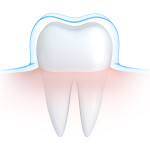What Can You Do About Sensitive Teeth?
Article Featured on WebMD
Tooth sensitivity can affect one or more teeth. It’s most common when you eat or drink something hot, cold, sweet, or sour. Sometimes a breath of cold air can set it off. The pain can be sharp and sudden and can shoot deep into the nerve endings of your teeth.
What Causes Sensitive Teeth?
You get sensitive teeth when your gums pull back and expose the surface beneath, called the dentin. This soft layer makes up the inner part and roots, which have thousands of tiny tubes that lead to the tooth’s nerve center (the pulp). These channels allow the trigger — for example, the hot, cold, or sweet food — to reach the nerve in your tooth, which results in the pain you feel.
Other things that can cause sensitive teeth are:
- Wear and tear. Over time, brushing too hard or using a hard-bristled toothbrush or grinding your teeth can wear down enamel and expose the dentin.
- Tooth decay near the gum line.
- Gum disease (gingivitis). Inflamed and sore gums pull back and expose the roots of your teeth.
- Damage. Chipped or broken teeth may fill with bacteria. The bacteria can enter the pulp, causing inflammation.
- Teeth grinding. Grinding or clenching your teeth may wear down the enamel and expose the dentin.
- Tooth-whitening products. These products may be major contributors to sensitive teeth.
- Age. Teeth are most sensitive between ages 25 and 30.
- Plaque buildup. The presence of plaque on the root surfaces can cause sensitivity.
- Long-term mouthwash use. Some over-the-counter products contain acids that can make sensitivity worse if your dentin is already exposed. Ask your dentist about a neutral fluoride solution.
- Acidic foods. Food and drinks with a high acid content, like citrus fruits, tomatoes, pickles, and tea, can wear down enamel.
- Dental work. Teeth cleaning, root planing, crown placement, and tooth restoration can make teeth sensitive. This should go away in 4 to 6 weeks.
Steps to Reduce Tooth Sensitivity
The good news is there are many ways to control sensitive teeth. You can:
- Brush and floss regularly. Use proper brushing and flossing techniques to thoroughly clean all parts of your teeth and mouth.
- Use a soft-bristled toothbrush. Brush gently and carefully around the gum line so you don’t remove gum tissue.
- Use a toothpaste for sensitive teeth. Several brands are available. Regular use should make teeth less sensitive. You may need to try several brands to find the product that works best for you. Another tip: Spread a thin layer on the exposed tooth roots with your finger or a Q-tip before you go to bed. Use a fluoridated toothpaste, not atartar control one.
- Watch what you eat. Avoid lots of highly acidic foods and drinks.
- Use fluoridated dental products. Using a fluoridated mouth rinse daily can decrease sensitivity. Ask your dentist about products available for home use.
- Don’t grind your teeth. Use a mouth guard at night.
- See your dentist every 6 months (or sooner, depending on your condition).
If you still have discomfort, talk to your dentist. There may be a procedure that can help. He might recommend:
- White fillings(bonding) to cover exposed root surfaces
- Fluoride varnishes applied to the exposed root surface
- Dentin sealers applied to the exposed root surface
Looking for an orthodontist in Beaverton, Oregon? Biermann Orthodontics is a cutting-edge orthodontic practice that serves Beaverton and Molalla, OR, and focuses on providing world-class customer service and efficient treatment. We strive to create stunning smiles in the shortest amount of time without ever sacrificing quality.
Visit our Locations page to find a clinic near you, or schedule an initial consultation.
Biermann Orthodontics
503-690-0722
17885 NW Evergreen Parkway, Suite 200
Beaverton, OR 97006




